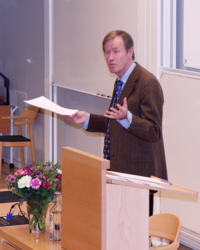
Felix Neubergh-föreläsningen
Vartannat år är Handelshögskolan värd för Felix Neubergh-föreläsningen. Dessa år handlar föreläsningen om utmaningar inom bank och finans, och internationellt erkända och framstående personer bjuds in som föreläsare.
Felix Neubergh-föreläsningen har hållits varje år sedan 1977. Vartannat år handlar föreläsningen om utmaningar inom bank och finans, och vartannat år ämnet arkeologi. Dessa år är en annan del av Göteborgs universitet värd.
En generös donation
Felix Neubergh-föreläsningen har etablerats tack vare donationer från den bortgångna bankmannen Felix Neubergh och hans fru Bertha. Felix Neubergh var född i Göteborg och gav under ett antal år generösa stöd till olika institutioner i sin hemstad, särskilt till Göteborgs universitet. Han strävade efter att stötta universitetets kontakter med kultur och vetenskap i engelskspråkiga länder.
Tidigare föreläsare
2011 Lars E.O. Svensson
2009 Lars Calmfors
2007 Karin Forseke
2005 Sirkka Hämäläinen
2003 Lars Heikensten
2001 Barry Eichengreen
1999 Urban Bäckström
1997 Curt Nicolin
1995 Kjell-Olof Feldt
1993 Helmut Schlesinger
1991 Pehr G Gyllenhammar
1990 Bengt Dennis
1987 Roy Jenkins
1985 Hermod Skånland
1983 Harold Wilson
1981 Max Jakobson
1979 Edward Heath
1977 Gunnar Myrdal

